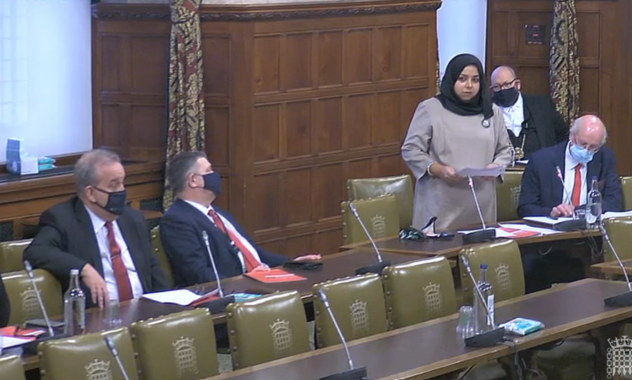
An Easy Guide to the Taylor Review
All of Matthew Taylor's recommendations, as they pertain to employment law.
Our easy guide to the Taylor Review includes a list of all Taylor's recommendations as they pertain to employment law, compared with our own recommendations made as part of our Manifesto for Labour Law.
The 116-page Taylor Review into the exploitation of ‘gig economy’ workers was published on Tuesday 11 July 2017 and offered a huge number of recommendations. It did not, however, propose any significant changes to the law.
Although it was widely criticised across the labour movement for tinkering around the edges without providing the support that workers need, the Conservative Government has confirmed it will base its employment law reforms on Taylor’s proposals.
What it says; what it means
-
Change the employment status of 'workers' to 'dependent contractors'
What Taylor recommends
- Embed case law into primary legislation to set out tests of employment status that reflect the reality of work undertaken and emphasise the control exercised by employers rather than the requirement to perform work personally.
- Provide an online tool to help individuals establish their status.
- Remove the right currently afforded ‘workers’ to minimum wage legislation and replace it with Piece Rate offering (wages section, below).
What it means for workers
- This rebranding exercise is a gift to ‘gig economy’ companies that hope to avoid the minimum wage, as it will become the worker’s responsibility to only accept work that pays highly enough to make up any shortfall.
- Retaining a three-tier system of employment status means employers can continue to undercut “employees” (who have access to the full suite of rights) with ‘Dependent Contractors’ (who have fewer rights).
What IER recommends
- Scrap the three-tiered system and have one universal employment status for everyone in employment which provides for all rights from day one.
-
Change wage laws to prevent the worst exploitation while moving workers on to 'piece rates'
What Taylor recommends
- Provide a higher National Minimum Wage for non-guaranteed hours and task the Low Pay Commission with looking into how this would work.
- Repeal the “Swedish Derogation” – legislation that allows agency workers to opt out of equal pay entitlements in return for being paid between engagements
- Piece Rates for “Dependent Contractors” – employers must prove it is possible to earn 1.2 times minimum wage through their platform and provide warnings when rates for a “gig” fall below minimum wage, but if they take such “gigs”, workers “opt out” of minimum wage rights.
What it means for workers
- Recommendations focus on discouraging worst of exploitation and piece rates recommendation risks undermining minimum wage.
- No support for improving pay rates despite OECD warnings that the UK is one of the only advanced economies set for a decline in real wages next year.
- Retaining a three-tier system of employment status means employers can continue to undercut “employees” (who have access to the full suite of rights) with ‘Dependent Contractors’ (who have fewer rights).
What IER recommends
- Reinstate sector level collective bargaining to allow workers to negotiate fair wages across their industry.
- Introduce a genuine Living Wage for all workers.
-
More access to holiday pay for insecure workers
What Taylor recommends
- Promote awareness of the right to holiday pay among agency and zero hours workers.
- Calculate holiday pay entitlement on the basis of the number of hours worked over a period of 52 weeks, rather than 12.
- Allow “rolled-up” holiday pay so that workers can accrue their annual leave in ‘real-time’.
What it means for workers
- Improving workers’ awareness of their rights is practically worthless when nothing is done to improve the enforcement of those rights.
What the IER recommends
- Create an independent Labour Inspectorate to ensure the law is enforced.
- Reinstate sector-level collective bargaining to make it easier for workers to negotiate for fairer terms, including holiday pay.
-
Make it easier for insecure workers to qualify for employment rights
What Taylor recommends
- Extend from one week to one month the permitted break in service to accrue workers’ rights that are conditional on a qualifying period (e.g. unfair dismissal), and clarify when breaks are justified.
What it means for workers
- ‘Employees’ would still need to be in continuous employment for two years before they have the right to claim unfair dismissal.
- ‘Workers’ (or ‘dependent contractors’ would continue to have no right to unfair dismissal at all.
What IER recommends
- Have one universal employment status for everyone in employment that provides for all rights from day one.
- Create an independent Labour Inspectorate to ensure the law is enforced.
-
A universal right to a basic contract of employment
What Taylor recommends
- All people in employment should receive basic details of their employment relationship up front.
What it means for workers
- Information is meaningless without the power to enforce rights and to negotiate a better deal.
What IER recommends
- Have one universal employment status for everyone in employment which provides for all rights from day one.
- Create an independent Labour Inspectorate to ensure the law is enforced.
-
A right to request secure work
What Taylor recommends
- Provide agency workers with the right to request a direct contract of employment – but only after 12 months in the job.
- Provide zero-hours contract workers with the right to request a guaranteed hours contract that better reflects actual hours worked – but only after 12 months in the job.
What it means for workers
- A right to request is not a right to receive; and without enforcement of the right to request, many in precarious work will shy away from rocking the boat if it could mean losing work.
What IER recommends
- Have one universal employment status for everyone in employment which provides for all rights from day one.
- Create an independent Labour Inspectorate to ensure the law is enforced.
-
Consider how to promote flexible working
What Taylor recommends
- As part of Right to Request Flexible Working evaluation in 2019, consider how to promote genuine flexibility in the workplace – for e.g. allowing temporary changes to contracts.
- Work with organisations like Timewise and Working Families to encourage flexible working and initiatives like “happy to talk flexible working” among a wider range of employers.
What it means for workers
- Likely very little. There is no proposal to change the law to encourage flexible working arrangements, only plans to ask employers to consider it.
What IER recommends
- Make provisions for flexible working to permit, amongst other things, job shares, late starts, early finishes, term-time working, and working from home.
- Make parental leave genuinely flexible and shared, including through a reduction of working hours.
- Reinstate sector level collective bargaining to make it easier for workers to negotiate for fairer terms including flexible working.
-
Consider ways to encourage employers to value the wellbeing of their workers
What Taylor recommends
- Explore ways to support & incentivise local authorities to develop integrated approaches to improving health and wellbeing at work in order to help keep people with health problems in work.
What it means for workers
- No new rights for people with health problems and no action to improve health and safety regulations and enforcement, which could prevent work-related health problems that frequently affect workers’ employment opportunities.
What IER recommends
- Strengthen trade union rights, including those of Equality and Health & Safety Reps, so that workers have a voice when it comes to ensuring their health and safety and continued ability to work with long-term conditions and disabilities.
-
Give insecure workers sick pay
What Taylor recommends
- Make Statutory Sick Pay an explicit, basic employment right for which all workers are eligible regardless of income from day one.
- Make Statutory Sick Pay payable by the employer and accrued on length of service, in a similar way to paid holiday.
- Ensure good awareness of the sick pay rights amongst workers and businesses.
- Provide the right to return to the same or a similar job after a period of prolonged ill health & base this on current rights to leave, such as maternity leave. Make the right to return conditional on engagement with the Fit to Work Service where an assessment has been recommended.
What it means for workers
- Taylor gives with one hand while he takes with the other: Under his recommendations, workers on incomes too low to receive Statutory Sick Pay would now quality; but because it would be accrued by length of service, workers who fell ill near the start of a job would miss out.
- What’s more, the current Right to Return only applies to ’employees’, not ‘workers’ (or ‘Dependent Contractors’), so it is possible not everyone would qualify.
What IER recommends
- Have one universal employment status for everyone in employment which provides for all rights from day one.
- Reinstate sector-level collective bargaining to make it easier for workers to negotiate for fairer terms.
-
Giving workers a voice in the workplace
What Taylor recommends
- Extend the Information & Consultation (ICE) Regulations to include employees and workers and reduce the threshold for implementation from 10% to 2% of the workforce making the request.
- Require companies beyond a certain size to:
- Make public their model of employment and use of agency services beyond a certain threshold.
- Report on how many requests they have received (and number agreed to) from zero hours contracts workers for fixed hours after a certain period.
- Report on how many requests they have received (and number agreed) from agency workers for permanent positions with a hirer after a certain period.
- Work with trade unions, ACAS and Investors in People to promote good industrial relations.
What it means for workers
- This is a much less effective way to provide workers with a voice in their workplace than existing solutions. Trade unions offer a much more robust way of encouraging employee engagement than the ICE Regulations, but Taylor ignores the fact the government has introduced new anti-union laws, which make it significantly harder for workers to have a voice at work.
What IER recommends
- Repeal the Trade Union Act 2016.
- Strengthen trade union rights.
- Reinstate sector-level collective bargaining.
- Reinstate a Ministry of Labour and create a National Economic Forum to represent workers’ voices in Westminster.
-
Improve the likelihood that the law will be enforced
What Taylor recommends
- Allow workers to determine their employment status without paying any fee and at an expedited preliminary hearing.
- Flip the presumption so that it is for the employer to show that a particular employment relationship does not exist.
- Make HMRC responsible for enforcing the basic set of core pay rights that apply to all workers – NMW, sick pay and holiday pay for the lowest paid workers; as well as unpaid internships that break existing laws.
- Take action against employers/engagers who do not pay employment tribunal awards without the employee/worker having to fill in extra forms or pay an extra fee and having to initiate additional court proceedings.
- Establish a naming and shaming scheme for employers who do not pay employment tribunal awards within a reasonable time, potentially as part of compulsory reporting by employer.
- Require employment tribunals to consider the use of aggravated breach penalties and costs orders if an employer has already lost an employment status case on broadly comparable facts.
- Allow tribunals to award uplifts in compensation if there are subsequent breaches against workers with the same or materially the same working arrangements.
- Extend the remit of The Employment Agency Standards Inspectorate to include compliance with the Agency Workers’ Regulations, and to police umbrella companies and other intermediaries in the supply chain.
What it means for workers
- No independent agency to enforce most workers’ rights, thereby putting the onus on workers to enforce the law themselves.
- Compensation used as a deterrent to employers rather than as a means to cover the damages suffered by workers.
What IER recommends
- Create an independent Labour Inspectorate to enforce rights (and collective agreements) so
that the onus is not solely on workers to enforce their rights. - Reinstate sector level collective bargaining so that workers can agree in-house dispute resolution procedures with employers so that some matters need not go to court.
- Require employers to demonstrate compliance with labour standards, publish information on pay levels, pay differentials and the gender pay gap, and ensure their contractors comply with labour standards.
- Create a new system of Labour Courts involving representatives of employers and unions with increased powers of investigation.
- Remove mandatory requirement to seek early conciliation through ACAS.
- Remove cap on damages for unfair dismissal and compensate workers for all earnings lost.
- Give Labour Courts and the Labour Inspectorate powers to enforce the payment of awards.
- Introduce criminal penalties for worst offending employers.
-
Improve the quality of work
What Taylor recommends
- Make BEIS responsible for reporting on quality of work annually against a set of metrics with the first report in 2018 acting as a baseline for measuring future success.
- Ensure Industrial Strategy includes focus on lower-paid and lower-skilled sectors.
- Widen remit of Low Pay Commission to make recommendations on how to improve quality of
work. - Take a sectoral approach to improving the quality of work.
What it means for workers
- No mechanism through which workers are consulted on the quality of their work or how it should be improved.
What IER recommends
- Reinstate sector level collective bargaining to allow workers to negotiate for better quality of work.
- Establish a National Economic Forum that brings together representatives of employers, workers and other stakeholders in society to inform policymaking including the nation’s Industrial Strategy.











At the intersection